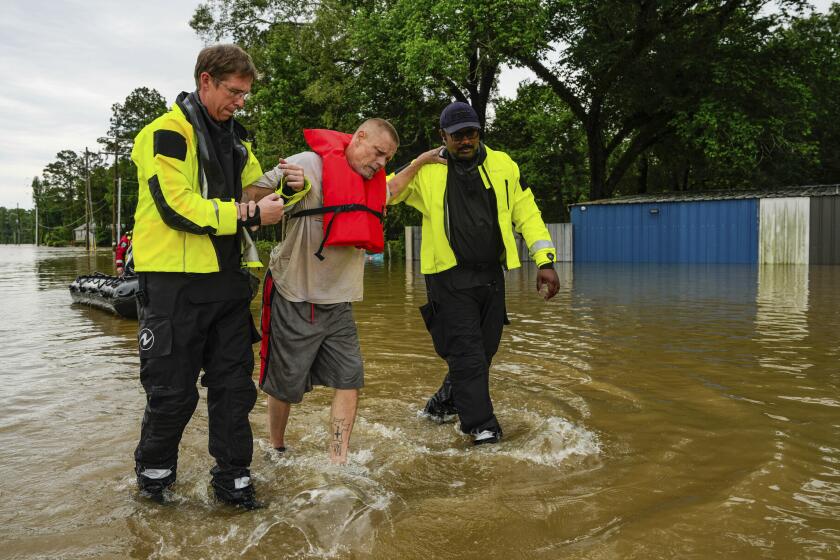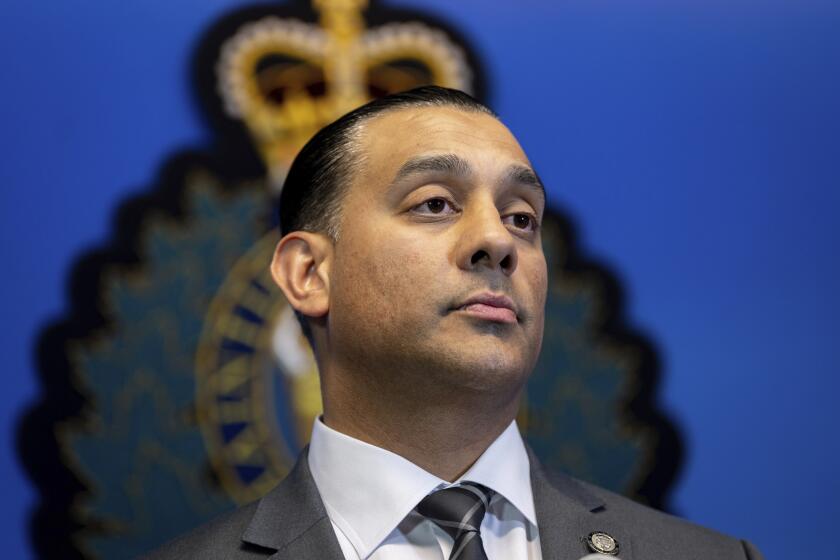OPEC Near Accord on Higher Price, Meeting an Iraqi Goal : Oil: A new figure in the $20 range is expected. This has been an issue in Baghdad’s confrontation with Kuwait.
Ministers of the OPEC oil cartel Thursday neared agreement on a higher target price, meeting a key goal of Iraq in its stormy but now-receding confrontation with neighboring Kuwait in the Persian Gulf.
“We will have a new minimum reference price,” Sadek Boussena, president of the Organization of Petroleum Exporting Countries, said after the initial session of the cartel’s semi-annual meeting in Geneva.
Strapped for revenues and hurt by a glutted oil market, Iraq had called for an average price of $25 a barrel. Ten days ago, President Saddam Hussein’s regime unleashed a scalding campaign of threats and accusations against Kuwait and the United Arab Emirates for overproduction, which Baghdad charges has held the price below the current $18 target level.
On Thursday, with Iraq’s demand for a face-to-face meeting with Kuwait met and with apparently unanimous support for higher prices at the Geneva meeting, Hussein turned off the steam, abruptly ending the propaganda barrage.
The OPEC ministers, speaking with reporters, suggested that the adopted price would be closer to $20 than the Iraqi-requested $25, but a compromise appeared imminent. More difficult will be agreement on the production ceilings allotted each of the 13 member countries to support the price.
Kuwait and the Emirates reportedly were pumping 2 million barrels a day in recent months, 500,000 barrels over their limit under the present agreement. In addition, Libya came to this meeting demanding an increase in its quota. Other OPEC nations likely will seek increased production as well.
OPEC figures show that the cartel, which controls 60% of the world’s oil exports, had an output of 23.5 million barrels a day for the three months ending in June. At Geneva, proponents of higher prices were talking of enforcing an overall ceiling of 22.5 million barrels a day.
For the consumer, market analysts estimate that every $1 rise in the OPEC target price translates into a 5-cent increase at the gasoline pump in the industrialized Western countries.
The struggle moved from political crisis in the Middle East to business bargaining in a Geneva hotel with Egyptian President Hosni Mubarak’s disclosure Wednesday night that Iraqi and Kuwaiti officials would meet this weekend in Jidda, Saudi Arabia. The announcement was confirmed Thursday by Iraqi officials, according to press reports from Baghdad.
Representatives of Iraq’s controlled press said they had received orders the night before to shut down their blistering propaganda campaign against Kuwait, and Thursday’s newspapers dropped the story as suddenly as it had flared.
Kuwaiti newspapers, reporting Mubarak’s announcement, declared “It’s Over” and “It’s Solved” in their headlines.
At least the thunder had gone out of the confrontation, which began last week with hard-edged threats by Hussein to punish Kuwait for allegedly conspiring with Washington to bleed Baghdad by driving down oil prices. By this week, the Iraqi attacks had become ugly and personal, accusing the Kuwaiti foreign minister of being a “tool of America.”
Press reports, confirmed by the State Department in Washington, said Iraq had moved two armored divisions, or 30,000 personnel, south to its 100-mile border with lightly armed Kuwait. Baghdad did not deny it.
In clear response, the United States announced that its seven-vessel gulf flotilla had begun “short-notice” maneuvers in the international waters of the gulf, triggering an alarm in the Baghdad press about foreign power in an “Arab sea.”
Hussein called in April Glaspie, the U.S. ambassador to Baghdad, on Wednesday and told her that an American response was out of line and that the naval deployment had betrayed him, according to reports from Washington.
However, the climate changed Thursday. In Geneva, Iraqi Oil Minister Issam Abdul-Rahim Chalabi denied there had been a buildup of troops.
“There is no such thing as a massing of troops along the border,” he insisted.
Meanwhile, press reports from Baghdad quoted Arab diplomats as saying there had been some troop movement but that Hussein’s government had agreed to a Kuwaiti demand that the troops be pulled away from the border before the weekend talks in Jidda.
The political focus switched to the Jidda meeting, which reports said will begin Sunday or Monday. Egyptian Foreign Minister Esmat Abdel Meguid said that the Kuwaiti team will be headed by the nation’s prime minister, Sheik Saad al Abdullah al Sabah, and that Iraq has yet to name its participants.
The talks are expected to deal with preliminaries, identifying the differences between the two oil producers, which include both oil policy and territorial disputes.
A key issue will be Iraq’s charge that Kuwait has stolen $2.4 billion worth of oil from a field that crosses the frontier. The Ramaila field noses into Kuwaiti territory, and the Kuwaitis pumped oil from it during the 1980-88 Iraq-Iran War, when Baghdad was not working its larger portion of the Ramaila pool. Iraq is expected to ask for the $2.4 billion, although Kuwait has denied that its operations were illegal.
However, Kuwait is more likely to accede to problems that can be solved with money--including Baghdad’s insistence that Kuwait formally forgive its war debts--than to give way on territorial disputes.
The key Iraqi demand on the frontier concerns the islands of Bubiyan and Warba, which lie across Baghdad’s main access to the gulf. Iraq professes sovereignty over the islands, which are also claimed, and militarily occupied, by Kuwait.
But what most Middle East analysts insisted was the main purpose of the Iraqi-fomented blowup--OPEC oil policies--will be decided at the Geneva meeting. Talks will resume today.
Iraq’s problem is a lack of hard cash to rebuild its war-damaged economy. If its cartel partners raise the target price of oil and support the price with strictly enforced production quotas, Baghdad’s revenues should rise.
Opening the meeting, President Boussena, an Algerian, conceded that the cartel’s “fortunes have faded badly.” Overproduction has flooded the market since the barrel price hit more than $20 last year, and this spring it tumbled to less than $14. At Iraq’s level of export, every $1 drop in price, if sustained for a year, would cost the Iraqi government $1 billion.
Each producing country has different potential, and many disagree on overall policy. Some argue that enforcing a high price will force consuming nations to look for energy alternatives, as they did during times of high oil prices in the last two decades. Some, such as Saudi Arabia, Kuwait and Venezuela, have bought into distribution networks in the industrialized countries, and higher prices for crude oil would hurt them at the other end of their investments.
Iraq also has a problem with production: It has been pumping close to its quota--almost 3 million barrels a day, according to OPEC reports--but it lacks the immediate ability to produce much more, so its best policy is controlled production that maximizes the price it gets for what it can produce.
Despite claiming the world’s second-largest pool of oil reserves, after Saudi Arabia, Iraq badly neglected its fields during the war.
“It will take a lot of time--and expertise that the Iraqis would have to import--to get their fields back into good condition,” one oil analyst said.
OPEC’s members are the Arab nations of Algeria, Iraq, Kuwait, Libya, Qatar, Saudi Arabia and the United Arab Emirates and non-Arab Ecuador, Gabon, Indonesia, Iran, Nigeria and Venezuela.
More to Read
Start your day right
Sign up for Essential California for news, features and recommendations from the L.A. Times and beyond in your inbox six days a week.
You may occasionally receive promotional content from the Los Angeles Times.






